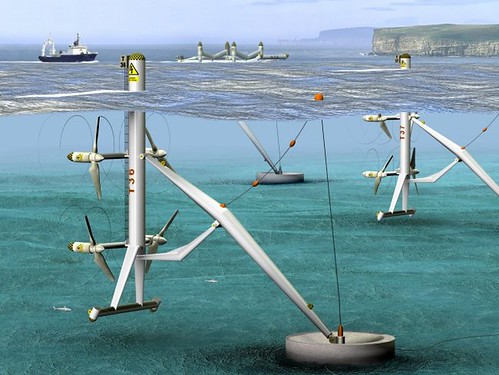Scottish Power Renewables last Friday released data showing that it had doubled its installed base of renewable power, from 382 MW to 665 MW in 2008. Renewable power generation more than doubled, rising 118% to 1,227 Gwh year-to-year.
 The company erected more than 100 turbines at the Whitelee wind farm project near Glasgow and expects to have another 38 up and running this summer. If a second, recently filed expansion is approved by the Scottish government what's already the largest wind farm project in Europe will grow to include 221 turbines with a rated capacity of 614 MW, some 55,800 MW more than is required to supply all of Glasgow's 340,000 households, according to the company.
The company erected more than 100 turbines at the Whitelee wind farm project near Glasgow and expects to have another 38 up and running this summer. If a second, recently filed expansion is approved by the Scottish government what's already the largest wind farm project in Europe will grow to include 221 turbines with a rated capacity of 614 MW, some 55,800 MW more than is required to supply all of Glasgow's 340,000 households, according to the company.
Following close on the heels of that announcement, management announced that it had been granted an “exclusivity agreement” by the Crown Estate to assess the potential for an offshore wind farm to be built west of Argyll and the island of Tiree. The site's potential wind power resources have been estimated to be anywhere from 500 MW to 1,800 MW, enough to run the lights, appliances and electrical equipment at 270,000 to 1,000,000 homes, according to a news report.
“Offshore wind power has massive potential, and the UK Government has already outlined ambitions to generate up to 33,000 MW of power off the UK coastline,” ScottishPower Renewables' director Keith Anderson said. "Scotland has the best onshore wind resources in Europe, and now it is taking its first steps towards harnessing its offshore potential, which will play a major role in helping to achieve renewable energy targets.”
Scottish Power Renewables was one of nine companies selected by the Scottish Crown Estate to assess and develop 10 offshore wind power projects. It's estimated that these could generate as much as 6 gigawatts of electrical power.
Overall, the Scottish government has set an interim target of renewable sources accounting for 31% of total electricity demand by 2011 and 50% by 2020.
Read more by Andrew Burger on Triplepundit